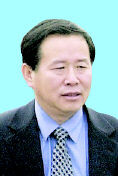hankyoreh
Links to other country sites 다른 나라 사이트 링크
North calls for negotiation on missile issue

North calls for negotiation on missile issue
Pyongyang says it is exercising its ’sovereignty’
As North Korea continues to delay the test launch of a technologically improved version of its Taepodong 2 missile, Pyongyang suggested the missile crisis should be solved through negotiations. In response to the test preparations, many hard-liners in Washington maintained the need for an improved missile defense system while at the same time calling on the government to strengthen diplomatic pressure against the North.
Han Song-ryol, North Korea’s deputy ambassador to the United Nations, in a June 20 telephone interview with Yonhap News said, "As a sovereign nation, [North Korea] has a right to export missiles as well as to develop, deploy, and test them. We are aware of the U.S. concern about our missile test-fire. Our position is to solve this problem by means of negotiations."
As for claims that North Korea is breaking its own missile moratorium, a deal brokered by U.S. negotiators and signed by Pyongyang and Tokyo in 2002, Ambassador Han referred to the fact that the agreement included a clause in which talks on the issue between the countries involved was a requirement. No such talks have taken place. "A so-called moratorium is effective only when Pyongyang and Washington hold talks," he said. "Some observers pointed out the missile test-firing violates the moratorium, but it is not true. At the time [of the agreement], Pyongyang declared a temporary suspension of missile testing while the North was conducting talks with the U.S. and Japan to promote diplomatic relations," he added.
At a regular briefing on June 20, U.S. State Department deputy spokesman Adam Ereli said that Washington was cooperating with worldwide allies and North Korea’s neighbors, and said that the message is loud and clear that the U.S. does not want North Korea to conduct the test.
Yesterday, Pyongyang extended an invitation to U.S. Assistant Secretary of State Christopher Hill to visit the North. Secretary Hill has been the chief U.S. negotiator in the last several rounds of six-party talks regarding North Korea’s nuclear program. The proposal was quickly rejected by Washington, with Mr. Ereli saying direct talks between Washington and Pyongyang "are not in the cards."
Several U.S. politicians, such as Rep. Duncan Hunter (Republican-California), chairman of the House Armed Services Committee of Congress, stressed that Pyongyang’s actions underscored the need for the U.S. military to improve its missile defense system. Senate majority leader Bill Frist (Republican-Tennessee) in an appearance on the CBS television network said that the test-firing would be justification for U.S. military action.
South Korean Foreign Affairs & Trade Minister Ban Ki-moon, who is visiting Switzerland, placed calls to U.S. Secretary of State Condoleezza Rice and Japanese Foreign Minister Taro Aso regarding the issue. The three agreed to tackle the missile problem through diplomatic efforts.
Unification Minister Lee Jong-seok said in a meeting with opposition Grand National Party lawmakers that "If the North conducts the missile test fire, aid programs for the North, including rice and fertilizer, will be affected."
Editorial・opinion
![[Column] Park Geun-hye déjà vu in Yoon Suk-yeol [Column] Park Geun-hye déjà vu in Yoon Suk-yeol](https://flexible.img.hani.co.kr/flexible/normal/500/300/imgdb/original/2024/0424/651713945113788.jpg) [Column] Park Geun-hye déjà vu in Yoon Suk-yeol
[Column] Park Geun-hye déjà vu in Yoon Suk-yeol![[Editorial] New weight of N. Korea’s nuclear threats makes dialogue all the more urgent [Editorial] New weight of N. Korea’s nuclear threats makes dialogue all the more urgent](https://flexible.img.hani.co.kr/flexible/normal/500/300/imgdb/original/2024/0424/7317139454662664.jpg) [Editorial] New weight of N. Korea’s nuclear threats makes dialogue all the more urgent
[Editorial] New weight of N. Korea’s nuclear threats makes dialogue all the more urgent- [Guest essay] The real reason Korea’s new right wants to dub Rhee a founding father
- [Column] ‘Choson’: Is it time we start referring to N. Korea in its own terms?
- [Editorial] Japan’s rewriting of history with Korea has gone too far
- [Column] The president’s questionable capacity for dialogue
- [Column] Are chaebol firms just pizza pies for families to divvy up as they please?
- [Column] Has Korea, too, crossed the Rubicon on China?
- [Correspondent’s column] In Japan’s alliance with US, echoes of its past alliances with UK
- [Editorial] Does Yoon think the Korean public is wrong?
Most viewed articles
- 1‘We must say no’: Seoul defense chief on Korean, USFK involvement in hypothetical Taiwan crisis
- 2N. Korean delegation’s trip to Iran shows how Pyongyang is leveraging ties with Moscow
- 3[Column] Park Geun-hye déjà vu in Yoon Suk-yeol
- 4Amnesty notes ‘erosion’ of freedom of expression in Korea in annual human rights report
- 5‘Weddingflation’ breaks the bank for Korean couples-to-be
- 646% of cases of violence against women in Korea perpetrated by intimate partner, study finds
- 7[Reportage] On US campuses, student risk arrest as they call for divestment from Israel
- 8“Parental care contracts” increasingly common in South Korea
- 9[Interview] Dear Korean men, It’s OK to admit you’re not always strong
- 10Korean government’s compromise plan for medical reform swiftly rejected by doctors